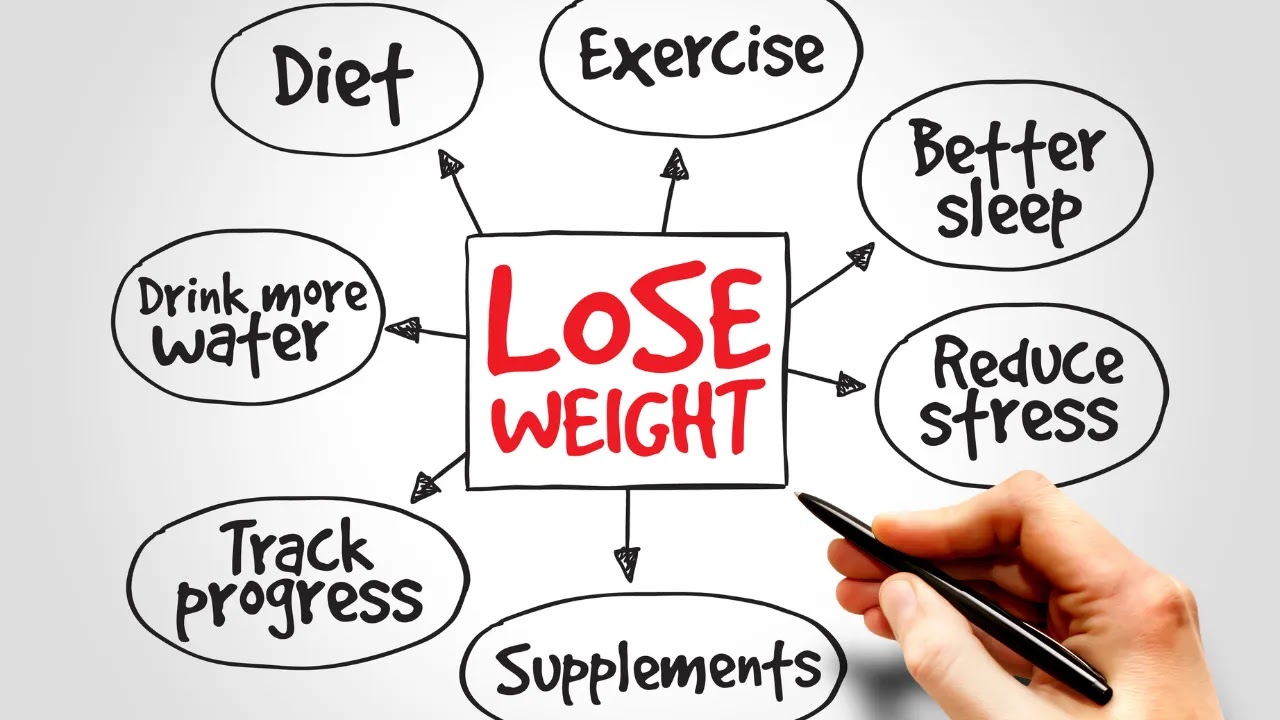Effective Strategies for Easy Weight Loss
Introduction
Overview of weight loss
Whether it's through dietary changes, regular exercise, or a combination of both, finding the right approach that works for you is key. By understanding the basics of weight loss and implementing these strategies, individuals can make progress toward a healthier and happier lifestyle.
Importance of maintaining a healthy weight
Maintaining a healthy weight is of utmost importance when it comes to overall well-being. Not only does it contribute to a better physical appearance, but it also plays a crucial role in preventing various health conditions.
By maintaining a healthy weight, individuals can reduce the risk of developing chronic diseases such as heart disease, diabetes, and certain types of cancer. Additionally, it can improve energy levels, enhance mental clarity, and boost self-confidence. Therefore, it is essential to adopt effective strategies for easy weight loss and make it a priority in our lives.
Common challenges in weight loss
Weight loss can be a challenging journey, and many individuals face common obstacles along the way. One of the most common challenges in weight loss is maintaining motivation. It can be difficult to stay motivated when progress is slow or when faced with temptations. Another challenge is dealing with cravings and emotional eating.
Many people struggle with controlling their food intake and turning to food for comfort or stress relief. Additionally, a lack of knowledge about nutrition and exercise can hinder weight loss efforts. Without understanding the right strategies and techniques, it can be challenging to make sustainable changes. Overcoming these common challenges requires determination, discipline, and a willingness to learn and adapt.
Setting Goals
Determining your ideal weight
Determining your ideal weight is an important step in your weight loss journey. It involves finding a weight that is healthy and sustainable for your body. There are several methods you can use to determine your ideal weight, such as calculating your body mass index (BMI) or consulting with a healthcare professional.
By knowing your ideal weight, you can set realistic goals and create a personalized weight loss plan that is tailored to your specific needs. Remember, the key to successful weight loss is not just about reaching a certain number on the scale, but also about achieving overall health and well-being.
Setting realistic and achievable goals
Setting realistic and achievable goals is crucial when it comes to weight loss. It is important to have a clear understanding of what you want to achieve and to set goals that are attainable. By setting realistic goals, you are more likely to stay motivated and committed to your weight loss journey.
It is also important to break down your goals into smaller, manageable steps. This allows you to track your progress and celebrate small victories along the way. Remember, weight loss is a gradual process, and setting realistic and achievable goals will help you stay on track and ultimately reach your desired weight.
Creating a Timeline for your weight loss journey
Creating a timeline for your weight loss journey is an essential step toward achieving your goals. By setting specific milestones and deadlines, you can track your progress and stay motivated throughout the process.
Start by determining your ultimate weight loss goal and then break it down into smaller, more manageable targets. Consider factors such as your current weight, lifestyle, and any upcoming events or commitments that may affect your timeline. Remember to be realistic and give yourself enough time to reach each milestone.
Additionally, it can be helpful to seek guidance from a healthcare professional or a certified weight loss coach to ensure you are setting realistic and healthy goals. With a well-planned timeline, you can stay focused and make steady progress toward your weight loss goals.
Healthy Eating Habits
Understanding calorie intake
Understanding calorie intake is crucial for effective weight loss. Calorie intake refers to the amount of energy that is consumed through food and beverages. By understanding and managing calorie intake, individuals can make informed choices about their diet and ensure they are consuming the right amount of calories to support their weight loss goals. It is important to strike a balance between consuming enough calories to fuel the body's needs while also creating a calorie deficit to promote weight loss.
This can be achieved by monitoring portion sizes, choosing nutrient-dense foods, and being mindful of high-calorie snacks and drinks. By understanding calorie intake, individuals can take control of their weight loss journey and make sustainable changes to their eating habits.
Choosing nutrient-dense foods
Choosing nutrient-dense foods is a crucial step in achieving easy weight loss. Nutrient-dense foods are those that provide a high amount of essential nutrients while being relatively low in calories.
These foods not only help in maintaining a healthy weight but also provide the necessary vitamins, minerals, and antioxidants that support overall well-being. When selecting nutrient-dense foods, it is important to focus on whole grains, lean proteins, fruits, vegetables, and healthy fats.
By incorporating these foods into your diet, you can ensure that you are getting the most nutritional value out of every calorie consumed, making weight loss easier and more sustainable.
Portion control and mindful eating
Portion control and mindful eating are two key strategies for achieving easy weight loss. By being mindful of the amount of food we consume, we can avoid overeating and ensure that we are eating the right portions for our body's needs.
This involves paying attention to our hunger and fullness cues, as well as being aware of the nutritional value of the foods we choose to eat.
Additionally, practicing portion control allows us to enjoy our favorite foods in moderation, rather than depriving ourselves completely. By incorporating these strategies into our daily routine, we can make sustainable changes to our eating habits and achieve our weight loss goals more easily.
Regular Exercise
Types of exercises for weight loss
There are various types of exercises that can help with weight loss. Cardiovascular exercises, such as running, cycling, and swimming, are great for burning calories and improving overall fitness. Strength training exercises, such as weightlifting and resistance training, can help build muscle and increase metabolism.
High-intensity interval training (HIIT) is another effective exercise method that involves alternating between intense bursts of activity and short recovery periods. Additionally, incorporating activities like yoga or Pilates can improve flexibility, balance, and core strength. It's important to choose exercises that you enjoy and can stick to in order to make weight loss more sustainable and enjoyable.
Creating an exercise routine
Creating an exercise routine is a crucial step in achieving successful weight loss. By incorporating regular physical activity into your daily routine, you can increase your metabolism, burn calories, and build lean muscle mass. It is important to choose exercises that you enjoy and that fit your fitness level and goals.
Whether it's going for a jog, attending a fitness class, or doing strength training exercises, finding activities that you find enjoyable will help you stay motivated and committed to your weight loss journey. Additionally, it is recommended to gradually increase the intensity and duration of your workouts to challenge your body and continue making progress.
Remember to consult with a healthcare professional before starting any new exercise routine, especially if you have any underlying health conditions or concerns.
Incorporating cardio and strength training
Incorporating cardio and strength training into your weight loss journey is essential for achieving optimal results. Cardio exercises, such as running, cycling, or swimming, help burn calories and improve cardiovascular health.
They also increase your endurance and stamina, making it easier to engage in other physical activities. On the other hand, strength training exercises, like weightlifting or bodyweight exercises, help build lean muscle mass.
This not only enhances your overall strength and stability but also boosts your metabolism, allowing you to burn more calories even at rest. By combining both cardio and strength training, you can maximize your weight loss efforts and achieve a toned and healthy physique.
Lifestyle Changes
Managing stress and emotional eating
Managing stress and emotional eating is crucial when it comes to achieving easy weight loss. Stress can often lead to overeating or indulging in unhealthy food choices, which can hinder progress toward weight loss goals.
By implementing effective strategies to manage stress, such as practicing mindfulness or engaging in stress-reducing activities like yoga or meditation, individuals can better control their emotional eating habits.
Additionally, seeking support from friends, family, or a therapist can provide valuable guidance and encouragement during the weight loss journey. By addressing the root causes of stress and emotional eating, individuals can create a healthier relationship with food and ultimately achieve their weight loss goals more easily.
Getting enough sleep
Getting enough sleep is crucial for successful weight loss. When we don't get enough sleep, our body's hormone levels are disrupted, leading to increased hunger and cravings for unhealthy foods. Additionally, lack of sleep can negatively affect our metabolism, making it harder for us to burn calories efficiently.
Therefore, it is important to prioritize sleep and aim for 7-9 hours of quality sleep each night to support our weight loss goals.
Limiting alcohol and sugary drinks
Limiting alcohol and sugary drinks is a key strategy for easy weight loss. These beverages are often high in calories and can contribute to weight gain. By reducing or eliminating alcohol and sugary drinks from your diet, you can significantly reduce your calorie intake and promote weight loss.
Instead, opt for healthier alternatives such as water, unsweetened tea, or infused water with fruits and herbs. Not only will this help you cut back on empty calories, but it will also keep you hydrated and support your overall health and well-being.
Tracking Progress
Keeping a food and exercise journal
Keeping a food and exercise journal is a crucial step toward achieving easy weight loss. By documenting what we eat and the physical activities we engage in, we become more aware of our habits and can identify areas for improvement.
This practice helps us make better choices and stay accountable for our weight loss goals. Additionally, a food and exercise journal allows us to track our progress, celebrate our successes, and learn from any setbacks. It serves as a valuable tool in our weight loss journey, providing us with valuable insights and motivation to stay on track.
Using technology and apps for tracking
Using technology and apps for tracking has become an increasingly popular and effective strategy for achieving easy weight loss. With the advancements in technology, there are now a plethora of apps and devices available that can help individuals monitor their daily calorie intake, track their physical activity, and even provide personalized meal plans.
These tools not only make it easier to stay accountable and motivated, but they also provide valuable insights and data that can help identify areas for improvement. Whether it's a step counter, a food diary, or a virtual coach, incorporating technology into your weight loss journey can greatly enhance your chances of success.
Celebrating milestones and staying motivated
When it comes to weight loss, celebrating milestones and staying motivated is crucial. Recognizing and rewarding yourself for achieving small goals along the way can help keep you motivated and on track.
Whether it's fitting into a smaller size of clothing, reaching a certain number on the scale, or completing a challenging workout, each milestone is a reason to celebrate. By acknowledging your progress and giving yourself a pat on the back, you'll be more likely to stay committed to your weight loss journey.
Additionally, finding ways to stay motivated is essential. This can include setting new goals, finding a workout buddy, or seeking support from friends and family. Remember, weight loss is a journey, and it's important to celebrate each step along the way while staying motivated for the long haul.










